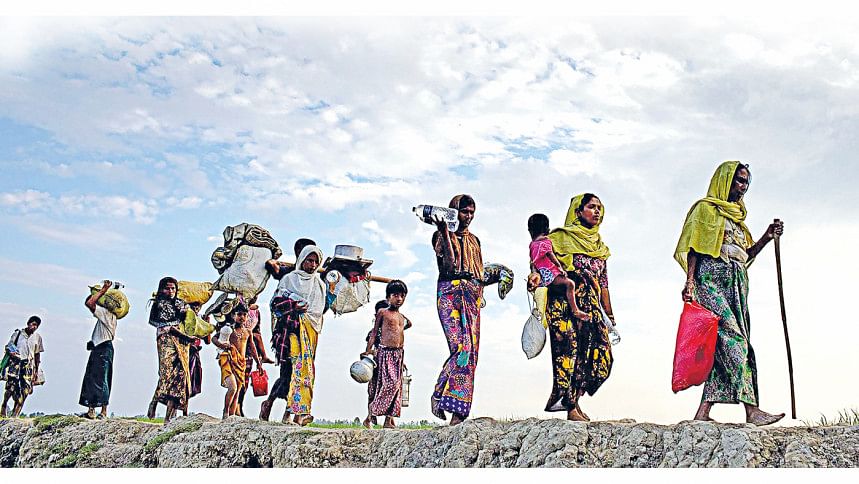Time to sign the Refugee Convention

In 1905, almost 46 years before the birth of the 'Convention relating to the Status of Refugees', commonly known as the 1951 Refugee Convention, Begum Rokeya, one of the pioneer feminist writers and scholars of Bengal talked about the 'Principle of non-refoulement' in her story Sultana's Dream. The principle of non-refoulement is one of the core principles of the Refugee Convention that prohibits the forcible return of refugees in any manner whatsoever to countries or territories where their lives or freedom would be at risk for reasons of conventional grounds (race, religion, and nationality, membership of a particular social group or political opinion). In the story, by providing a safe refuge to the asylum seekers and by taking a strong position of not forcefully returning them to their country of origin where their lives are at risk, the Queen of the Ladyland (in the story) sets an example of managing refugee issues in line with the modern international laws and conventions. The story further reiterates that providing refuge to vulnerable people is part of our national culture. Day by day, Sultana's dream is being realised in Bangladesh.
In the given context, it would be wise for the current interim government of Bangladesh to sign the 1951 Refugee Convention to maximise the benefits of hosting one million Rohingyas and minimising its harmful effects and bringing a durable solution to the problem.
A group of people think that Bangladesh should not sign the Refugee Convention. They place various arguments in favour of their decision. Firstly, they think that it will create a pull factor and encourage more Rohingyas from the Northern Rakhine State of Myanmar to enter Bangladesh. Secondly, they think that Bangladesh has no more capacity to take the burden of refugees as the country already has done enough by allowing more than one million Rohingyas to enter its territory. Thirdly, they refer to the other South Asian and Southeast Asian countries who still have not signed and/or ratified the Refugee Convention, e.g., India. Fourthly, they argue that it is the responsibility of the global powers and international humanitarian organisations to protect the refugees, not third-world countries such as Bangladesh. Last but not least, they fear that signing the Refugee Convention might pose a threat to the national security of Bangladesh. For these reasons, they think that it will not be wise to sign the Refugee Convention.
Another group of people think that Bangladesh must sign the Refugee Convention. They refute the arguments given by the first group by saying that their fear and logic are irrational as they do not understand the politics of international law and how the international organisations work in providing refugees protection in partnership with the host country. They would like to remind the other group that the primary responsibility of refugee protection lies with the host country as per international laws and practices. This group talks about the 'principle of non-refoulement' which protects any person from being transferred i.e., returned, expelled, extradited, etc. from one authority to another when there are substantial grounds for believing that the person would be in danger of being subjected to violations of certain fundamental rights thereby putting their lives in threat. This principle is found in different instruments of international law including the 1951 Refugee Convention. Most importantly, the principle of non-refoulement is considered to form a part of customary international law; meaning, even if Bangladesh does not sign/ratify a treaty, this rule will still be binding on Bangladesh. Therefore, even if Bangladesh is not party to the Refugee Convention, it cannot push back the refugees or say that it will not allow any more Rohingyas into its territory.
Moreover, recently Bangladesh signed the International Convention for the Protection of All Persons from Enforced Disappearance. It is important to note that Article 16 of this Convention reflects the principle of non-refoulement. Through the adoption of this instrument, Bangladesh has pledged to domesticate the relevant obligations and principles that it undertook. Therefore, by not signing the Refugee Convention, Bangladesh cannot ignore its commitment to the international community to protect the refugees. Also, the country cannot breach its pledge to contribute to the promotion of humanitarian assistance and protection of human rights. In the given context, it would be wise for the current interim government of Bangladesh to sign the 1951 Refugee Convention to maximise the benefits of hosting one million Rohingyas and minimising its harmful effects and bringing a durable solution to the problem.
The writer is senior research Associate, China–South Asia Center for Sociocultural Studies, North South University.

 For all latest news, follow The Daily Star's Google News channel.
For all latest news, follow The Daily Star's Google News channel. 



Comments